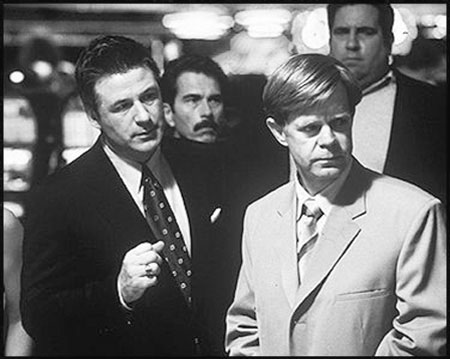By Danielle Stein
In ‘The Cooler,’ the seamy underbelly of Vegas is revealed. Or at least what Vegas used to be, before casinos housed roller coasters and entertainment became sugarcoated for the whole family. Seediness in this film practically drips off the screen, in the drab, tacky upholstery of the casino known as the ‘Shangri-La,’ and in the overly made-up faces of its haggard cocktail waitresses. It seems nothing could possibly be more depressing than the setting itself. Until Bernie Lootz appears.
Bernie, played by the profoundly talented William H. Macy, is the Shangri-La’s’ ‘cooler,’ a job description that entails curbing the good luck of any gambler on a winning streak. Coolers have various techniques. The unfailingly unlucky Bernie has only one: being himself. His mere presence at a table is enough to shut it down.
Working as the Shangri-La’s cooler is Bernie’s solution for paying off the $100,000 debt that manager and old friend, Shelly Kaplow (Alec Baldwin) paid off for him once upon a time. Shelly is a violent manipulator with an ethical code reminiscent of Mafia capos — he exudes fierce loyalty and the inclination to harm anyone who fails to return it. Inconvenienced by the fact that Bernie has nearly paid off his debt and plans to leave Vegas in a matter of days, he is determined to hold on to his most valuable asset.
Fortunately for Shelly, Bernie finds love in Vegas in the form of Natalie (Maria Bello), a Shangri-La cocktail waitress who’s already washed up despite not yet being thirty. But love has turned Bernie’s luck, and his talents as a Cooler begin to fade. Shelly, fast losing money to winning customers, demands that Natalie break Bernie’s heart.
Perhaps it’s backlash from a recent viewing of “Love Actually,” in which people fall head over heals in love in less time than it takes to get a Big Mac at the drive-thru, but the 48-hour gestation period of Bernie and Natalie’s romance seems deficient. The explanation offered is that they’re two kind souls weathered by the superficiality of a town like Vegas. But the hackneyed construction defies its own logic; it’s hard to believe Vegas veterans like these two would be so quick to trust. The plausibility of the relationship is further compromised by the extent of the cliché — cynical Vegas showgirl/cocktail waitress who fall for the nebbish after a string of tough-guy losers. But the flawed premise of the union is at least partially redeemed by nuanced, naked performances, especially from Macy.
The best performance, though, comes from Baldwin, whose thuggish Shelly is anything but one-dimensional. He punishes those who cross him with intense conviction, only to feel deep regret later. He is at once calm and collected and a walking time bomb. His complexity is perhaps best embodied in the motive for his murder of his best friend, an aging lounge singer portrayed by Paul Sorvino: to save him before he becomes an over-the-hill embarrassment.
Equally compelling is a secondary plot line in which Shelley’s partners have brought in a young, hot-shot consultant, smugly played by Ron Livingston, who aims to turn the Shangri-La into a Disneyfied money maker in the vein of today’s monster casino-hotels like the Palms and the Paris. Shelly fights to keep the Shangri-La as is, arguing for the legacy of old Las Vegas, in all its sordid authenticity. The theme of good and evil that coexist in this Las Vegas is nowhere better embodied than in Shelly himself, who is simultaneously sympathetic and repellent.
Tedious plot twists invoking the kind of frustrating dramatic irony found in bad sitcoms (audiences will spend too many minutes waiting for beatings they know are coming) are fortunately balanced out by solid acting and intriguing direction. The démodé nature of Sorvino’s lounge act is emphasized when parts of it are stretched into slow motion. The mystical concept of Macy’s cooler, the way his presence deadens a scene, is conveyed with eerie, often comical detail.
Several of the actors who worked on the film maintain that it’s a love story at its core. But the movie is at its most interesting in its exploration of Vegas culture and the ethics, relationships, and regrets that characterize the kind of lifestyle “The Cooler” examines. And in it’s toying with the idea that one makes his or her own luck even in a place like Vegas.
Reader Services

























